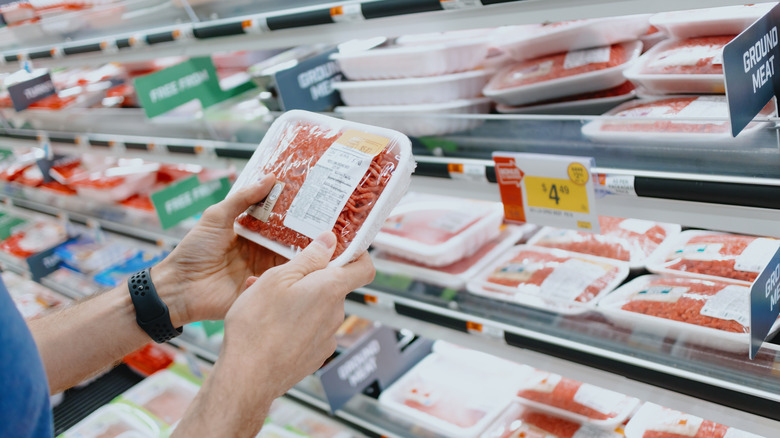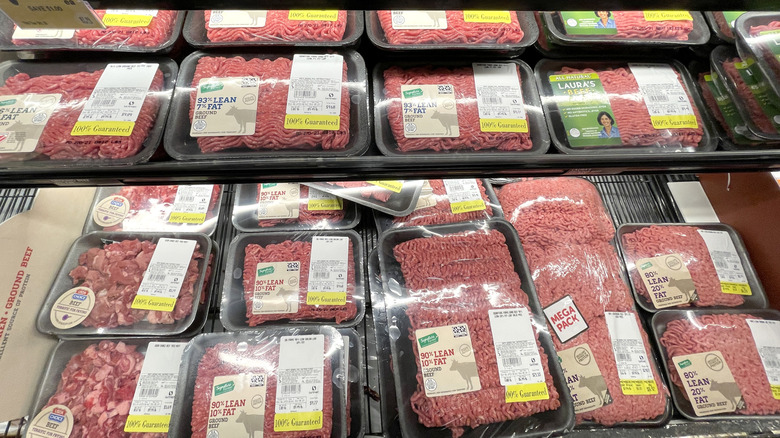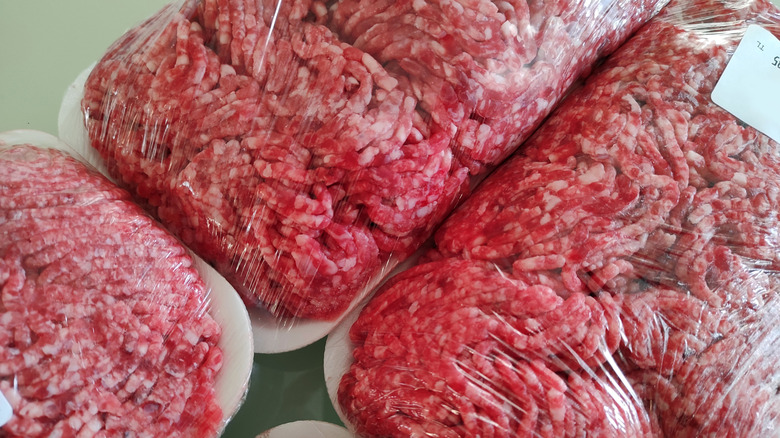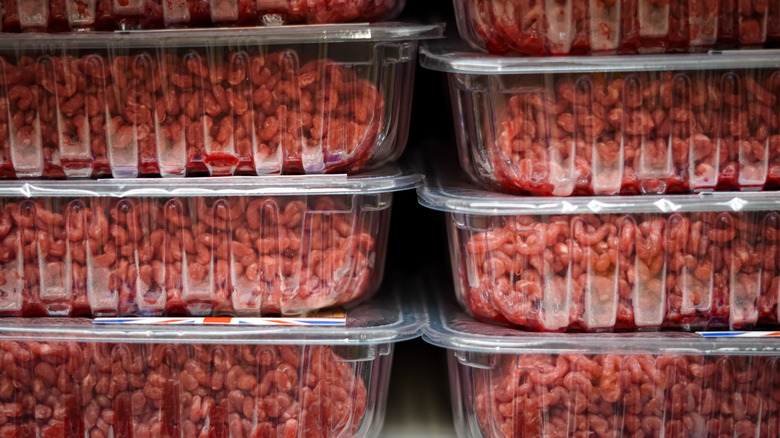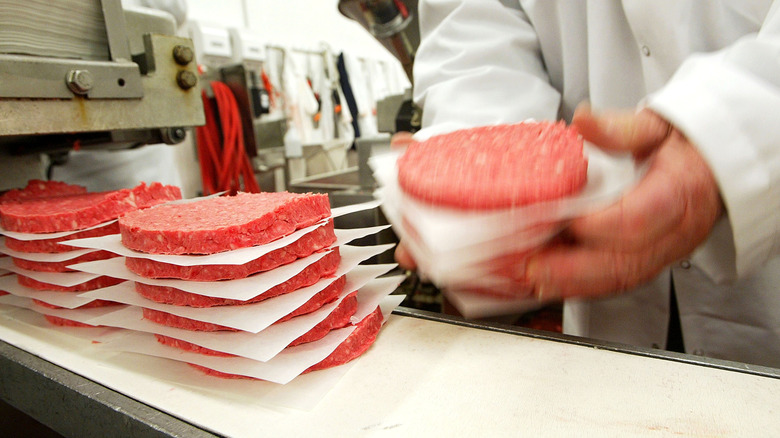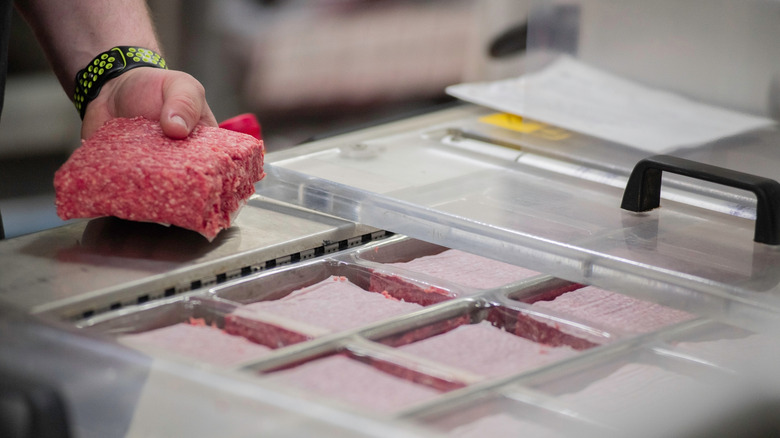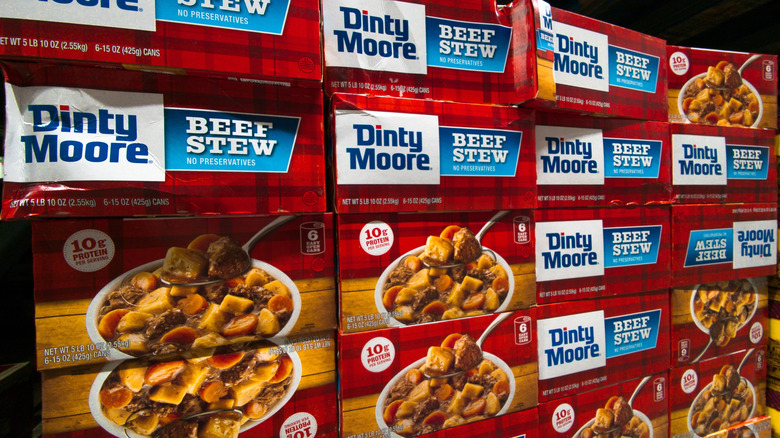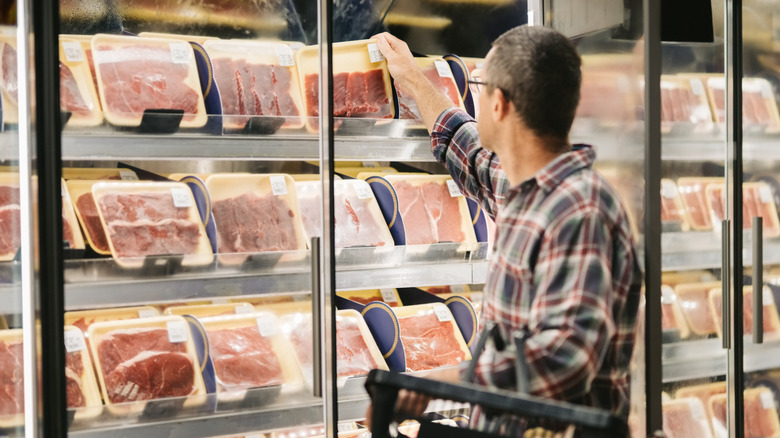11 Of The Biggest Beef Recalls In The US
The average American consumes around 1,885 pounds of food every single year and, with over 341 million citizens, the United States goes through an astronomical amount of food each day. All of this food needs to be produced in conditions that make it safe to consume. But, sometimes, despite rigid testing and regulations, slip-ups can happen and food thought to be safe can turn out to be potentially dangerous. In fact, every year around 128,000 people are hospitalized due to foodborne illnesses.
With 98% of households regularly purchasing it, meat plays a huge part in the American diet and the recall conversation. Ground beef in particular is often a part of food recalls, according to a ranking by Consumer Reports. This is mostly due to the prevalence of E. coli and salmonella — often the same reason fruits and vegetables are contaminated — in the process of cattle rearing and slaughter. But, regardless of how it comes about, beef recalls are a serious concern. Over the years there have been many that have affected people across the country. We're diving into 11 of the biggest beef recalls in U.S. history.
Hallmark/Westland Meat Co, 2008
The Hallmark/Westland Meat Co. beef recall was at the time, and is still today, the largest meat recall of any kind to happen in the U.S. It started when the Humane Society of the United States released video footage of Hallmark/Westland employees in Chino, California abusing non-ambulatory cattle in an effort to make them stand to pass required health inspections before slaughter. Non-ambulatory means they couldn't stand on their own, and slaughtering such animals for human consumption goes against federal regulations.
Following the release of the videos, the USDA Food Safety and Inspection Service opened an investigation and the consequences came in the form of a massive recall of over 143 million pounds of beef. The recall spanned two years' worth of Hallmark/Westlands production and, while the recall was large, the USDA maintained that the meat posed little or no hazard to those who had bought it. Regardless of that, the damage was done. Hallmark/Westland declared bankruptcy and several years later the company had a court judgment placed against it by a federal court totaling $497 million — the largest ever for animal abuse.
Rancho Feeding Corporation, 2014
Nearly 9 million pounds of beef produced by Rancho Feeding Corporation were recalled in 2014 due to what the USDA said was meat processed from unsafe and diseased animals and "produced without the benefit of full federal inspection." The recall didn't just affect ground beef sold in stores, instead encompassing a range of cuts from oxtails, hearts, tripe, veal cuts, and livers. On top of that, Nestlé voluntarily recalled the Philly Steak and Cheese flavor Hot Pockets because a supplier for them bought beef from Rancho Feeding Corporation.
Following the recall, the owners and several employees associated with the company were laid with criminal charges, according to the United States Attorney's Office in the Northern District of California. The owner, Jesse "Babe" Amaral Jr., was charged, alongside Eugene Corda, with "distribution of adulterated, misbranded, and uninspected meat," among others. As with Hallmark/Westland, Rancho Feeding Corporation shuttered following the massive recall as the company couldn't recoup the financial losses.
Hudson Foods, 1997
Before there was the Hallmark/Westland recall, Hudson Foods had the country's largest beef recall in 1997. Over 25 million pounds of beef produced at the company's Columbus plant were recalled. While many recalls are precautionary, the Hudson Foods recall was spurred by an outbreak of E.coli contamination in Colorado. Investigators were able to narrow down the specific dates when contaminated burger patty meat was being shipped to a handful of days in early June of 1997. Customers of Hudson Foods included large chains like Walmart to Burger King and measures were taken by those distributors to dispose of the meat.
In the aftermath, several employees of Hudson Foods were indicted on charges of providing the USDA with false information during the investigation. While the Columbus plant was eventually shut down because of the recall, Tyson Foods went on to acquire Hudson Foods for $642 million, after allegedly trying to acquire the company for over a decade.
ConAgra Foods, 2002
While there are safe ways to dispose of recalled foods, it's not ideal, and those who bought beef from ConAgra Foods back in 2002 certainly know this. The recall of 18 million pounds of ground beef and beef trimmings was voluntary, but that doesn't mean it wasn't without cause. Several cases of E.coli infection in Colorado were linked to meat from the plant and other infections in multiple states were noted. According to the USDA, only 17% of the recalled beef was recovered and an infection caused by the contaminated beef resulted in at least one death.
Several lawsuits were filed against ConAgra in the aftermath and as a result of the legal pressure and public perception of the recall, ConAgra made changes to the management and testing of animal products. It was reported that ConAgra used to test 30% of a given lot of product, but shifted to testing 100% as well as testing the carcasses of cattle and feeding live cattle additives to combat stomach pathogens.
Wolverine Packing Co, 2024
Some of the worst E.coli outbreaks in U.S. history were caused by contaminated beef, and while the Wolverine Packing Co. recall was not one of them, it goes to show that food safety is incredibly important for protecting our health. In November 2024, the Detroit-based Wolverine Packing Co. issued a recall for over 167,000 pounds of ground beef that was potentially contaminated with a strain of E.coli. Both fresh and frozen beef products were recalled. What's different about this particular recall, is that the recalled meat was sold to restaurants, not grocery stores.
Grocery shoppers can check their receipts to determine if they've bought a recalled item, but restaurant-goers don't have the same option. As such, restaurants were responsible for ensuring diners were eating safe meat. At least 15 people fell ill because of meat linked to Wolverine, and while the company alerted its customers, smaller businesses may not have had the capacity or manpower to quickly remove the meat from kitchens.
Beef Packers Inc, 2009
Not only was California-based plant Beef Packers Inc. involved in a beef recall in the summer of 2009 but months later it was the source of a second recall. The August recall was the larger of the two, calling for the removal of more than 800,000 pounds of ground beef from shelves and homes. What caused this first, massive recall, you might ask? At least 68 reported salmonella-related illnesses across 15 separate states.
Salmonella is a tasteless bacteria that you can't smell — just one of many reasons why relying on the smell test for expired or tainted meat is a huge mistake. The particular Newport salmonella strain found in the beef is incredibly dangerous due to its resistance to many drugs. In December, Beef Packers Inc. put out a recall for another 22,000 pounds of ground beef that, while smaller than its August counterpart, was still just as potentially dangerous considering the Newport strain was a concern again.
Topps Meat Company, 2007
In the initial recall that Topps Meat Company — the largest frozen hamburger manufacturer in the country — put out in 2007, only 331,582 pounds of frozen ground beef patties were affected. That might sound like a ton of beef, but it's nothing compared to the 21.7 million subsequent pounds of ground beef included when the recall was expanded. The New York State Department of Health discovered the E.coli contamination in the beef after sampling the product during a coordinated investigation with the CDC. At the time, it was the second-largest beef recall in U.S. history and the plant was shut down immediately following the recall.
Only one week after the second round of recalls Topps announced that it was going out of business completely. At least two lawsuits were filed against Topps in the state of New York on behalf of those who became ill from the meat, of which there were at least 40.
JBS Swift Beef Company, 2009
In June 2009, illnesses across multiple states brought investigators to the JBS Swift Beef Company, resulting in an initial recall of over 41,000 pounds and an additional voluntary expansion to include an extra 380,000 pounds of beef. While a majority of those who were subsequently affected lived in California, the tainted meat sickened people across states, even reaching as far as New York and New Jersey.
A lawsuit was filed against JBS on behalf of a 14-year-old boy, who was infected with E.coli after eating the affected meat. The lawsuit claimed that the company didn't provide enough public information on the distribution points of the beef, thus preventing retailers from making swift changes. That echoed sentiments from an attorney for the Center for Science in the Public Interest, who spoke out against JBS' choice not to publicize affected customers. JBS is still in business today, unlike many other companies that were unable to come back from the financial strain of a mass recall.
Cargill Meat Solutions, 2018
Cargill Meat Solutions had a bad year in 2018. As with Beef Packers Inc. in 2009 (which was owned by Cargill at the time), Cargill Meat issued two separate beef recalls in the same year, this time due to E.coli concerns. The first occurred in August of that year with the Colorado company recalling over 25,000 pounds of ground beef. Much larger, the second recall in September noted that as much as 132,000 pounds of beef could be affected.
It was in mid-August when the USDA's Food Safety Inspection Service was given notification of an investigation into E.coli instances tied to Cargill. The investigation concluded that the beef was the most likely culprit. Unfortunately, many of the illnesses, and even one death, occurred prior to the recall. As with other recalls, a primary concern was that even if a recall went out, consumers may not be aware of it, or the meat may be in their freezers and forgotten about. This is why it's so important to cook meat thoroughly and avoid common meat food safety mistakes.
Hormel Foods Corporation, 2025
There are many ways to pick the perfect cut of meat for beef stew, but sometimes a canned option is the easiest, quickest way to go. Unfortunately, canned beef stew was at the center of the Hormel Foods Corporation recall in May of 2025. While most (read all) of the other recalls we've talked about were due to potential issues with the meat itself, the Hormel recall had to do with wood. Yes, like the stuff trees are made out of. Over 256,000 pounds of canned beef stew were recalled due to inedible material in the food.
Three consumer complaints were filed about wood fragments in the beef stew, which then prompted the recall. No injuries were reported, but since the product is canned — and has a longer shelf life than fresh beef — the concern from the FSIS is that contaminated cans may sit on shelves and get consumed at a later date.
American Foods Group, 2023
In 2023, a state public health official in Wisconsin, who had been testing meat for foodborne illnesses, notified the USDA of contaminated beef, causing American Foods Group (and business operator Green Bay Dressed Beef) to recall over 58,000 pounds of raw ground beef. The E.coli contaminated meat had been sent across the country from Georgia and Michigan to Ohio, but luckily there were no confirmed reports of illness.
While there are hundreds of strains of E.coli, the strain found in the American Foods Group meat was Shiga toxin-producing E.coli, also known as STEC. Shiga-toxins can cause some pretty severe symptoms like vomiting and diarrhea and can, in some extreme cases, trigger kidney failure. While most occurrences of E.coli in meat come from the bacteria naturally found in cattle intestines, there's no way to tell for sure what led to the contamination and subsequent recall at American Foods Group.
